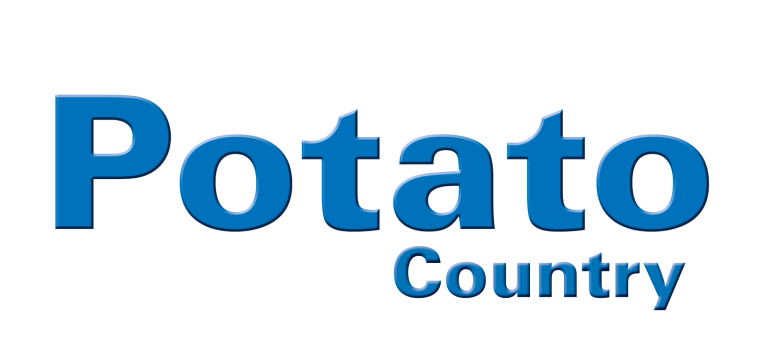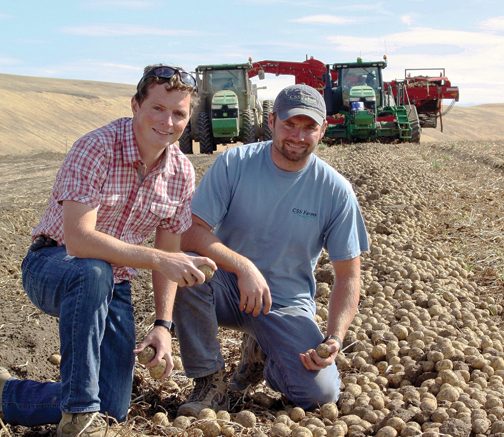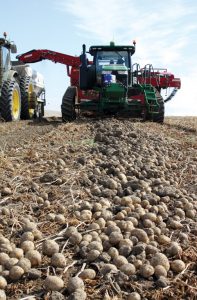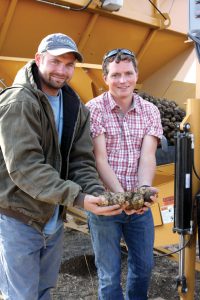Story and photos by Denise Keller, Potato Country Editor
Farming with the motto “committed to excellence” requires discipline and innovation. Rising to the challenge, CSS Farms has used the motto to guide its success in the chip potato business for the last three decades. The same approach continues to serve the company well as it also makes its mark in the seed potato business, producing quality seed for the operation and its customers.
Multi-State Operation
Named for founders Milt Carter, Randy Spevak and Brad Spevak, CSS Farms was formed in Watertown, South Dakota, in 1986. The farm soon began growing chip potatoes and expanded into Nebraska in 1993 and Texas in 1999. With the chip potato business growing rapidly, the owners were dissatisfied with the quality of seed they were able to buy, motivating them to step into the seed business. In 2000, CSS Farms developed a vertically integrated seed supply chain with isolated seed farms and a mini-tuber greenhouse.
Today, CSS Farms is led by Carter and three partners. Steve Gangwish manages the chip business in the Midwest. Bob Bender runs the company’s baby potato operation in California. And Reagan Grabner oversees operations in the Pacific Northwest.
Grabner, who was raised on a dryland wheat farm in Bickleton, Washington, before earning a master’s degree from Harvard University, was introduced to the potato business while working in finance for Lamb Weston. Wanting to return to production agriculture, he joined CSS Farms four years ago. He manages CSS Farms’ commercial potato operation in Mattawa, Washington; an organic vegetable farm in Boardman, Oregon; two seed potato farms in Idaho; and a seed potato farm in Ione, Oregon.
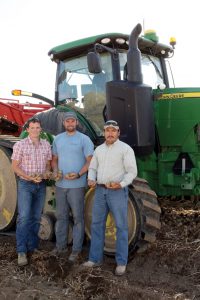
CSS Farms produces 3,600 acres of seed potatoes. Pictured, from left to right, at the farm’s location in northeast Oregon are Reagan Grabner, vice president; Dan Olteanu, farm manager; and José Gutierrez, lead operator.
Seed Production in Oregon
CSS Farms produces a total of 3,600 acres of seed potatoes, more than two-thirds of which is sold to external customers. About 650 acres are grown near Ione. The company started farming in Oregon three years ago in a move to produce seed near one of the most productive potato-growing regions in the country. The acreage is planted in 25 varieties including Alturas, Gala and Snowden.
While early-generation seed is grown on the company’s Nebraska farm, the Ione farm primarily produces Generation II seed. With its production system, the farm can produce Generation II at a cost that is competitive with Generation III on a delivered price to customers, Grabner says. In addition, Generation II seed comes with a reduced risk of disease and provides customers earlier access to new varieties.
On the flipside, however, the growing conditions of northeast Oregon present some seed production challenges. Due to the long growing season, planting is delayed – and yield is sacrificed – in order to prevent the crop from aging too much by harvest. In season, warm weather increases insect populations, requiring the farm to maintain an intensive insecticide program focusing on aphids and beet leafhoppers. The warm climate has also required the farm to make large investments in its storage facilities’ refrigeration and airflow in order to lower seed to its holding temperature rapidly after harvest.
CSS Farms utilizes bed planting on its Ione farm. Spuds are planted in seven rows per 12-foot bed, producing 18-inch spacing between rows and 18-inch in-row spacing. This allows the crop to achieve row closure more quickly, which is advantageous in the warm environment, according to Grabner. Bed planting increases uniformity in irrigation management and produces more even sets, larger sets, reduced greening and a higher proportion of single drop seed, the grower says.
Logistics Management
Seed production is pretty intensive, especially with five-day treatment intervals on the farm’s 25 seed lots, Grabner describes. To lessen the logistical challenges, the farm uses the AgriEdge Excelsior program from Syngenta. The program’s software, Land.db, helps with planning and recordkeeping of farm activities. Prior to the growing season, managers can map out fields and then generate work orders and track in-season chemical applications. This helps ensure the right products are applied at the right time, the grower says. He can also reference the data to answer questions from customers or landlords or to evaluate the efficacy of agronomic practices.
“It allows us to see the whole picture in one system, from planting to growing the crop to harvest, and then make the connections between those to understand what our yield was and what the cost of that was,” Grabner explains. “The implications for poor execution on a seed farm are really huge. You can have an insect problem that suddenly causes a disease problem. I would not want to farm without some sort of way to keep track of the program. Instead of shooting from the hip, we’re working from a plan. I think that makes all the difference in the world.”
The program has also helped improve communication within the multi-state CSS Farms team.
“One of our core values is that we believe the best decisions are made when all the stakeholders are allowed to help solve the problem,” Grabner shares, noting that the software generates concise reports that help individuals off-site understand what is happening on the farm and help employees without an agriculture background quickly become functional in the business.
More Than a Motto
Utilizing technology and innovative resources helps CSS Farms put its motto “committed to excellence” into action.
“We believe that you can’t be committed to excellence long term without also embracing innovation. I think we have generally high quality and innovative equipment, and we embrace the advice consultants give us,” Grabner says.
Farm managers highly value the opinions of university researchers and the consultants that regularly visit each of the company’s seed farms. CSS Farms also maintains close working relationships with chemical companies and hosts several on-farm trials each year including an evaluation of a potential new use for an existing product in 2016. As well, the company is aligned with breeding companies. Last year, the Ione farm hosted a breeding trial that included tens of thousands of potato cultivars in attempt to identify the next Russet Burbank, Grabner says.
“Through that, we believe we have a first look at new varieties that may come onto the potato market and provide benefits to growers in terms of yield or sustainability or to customers in terms of quality,” the grower adds.
A quest for quality is one shared by the entire operation. Farm managers try to remain disciplined about best practices that lead to long-term success, even when doing so requires extra effort. Company founders have always strived to preserve a family atmosphere inside the professionally-managed farm, according to Grabner, and owners continue to focus on having the best people in the best roles.
“We couldn’t do what we do without great people. We’re thankful for the dedication and commitment that all of our people have,” he shares.
